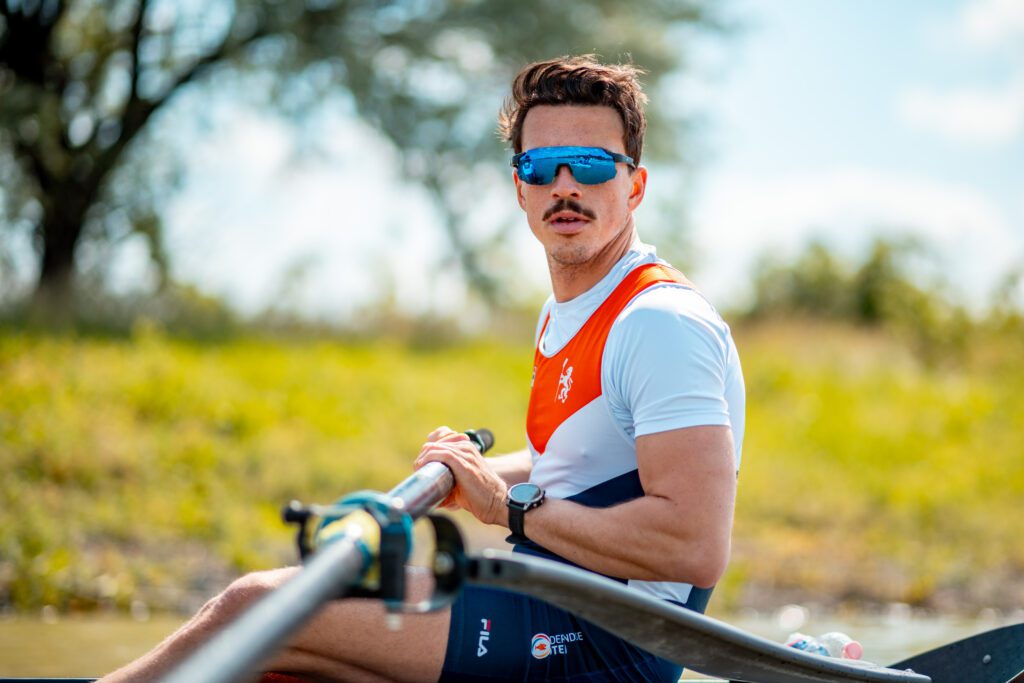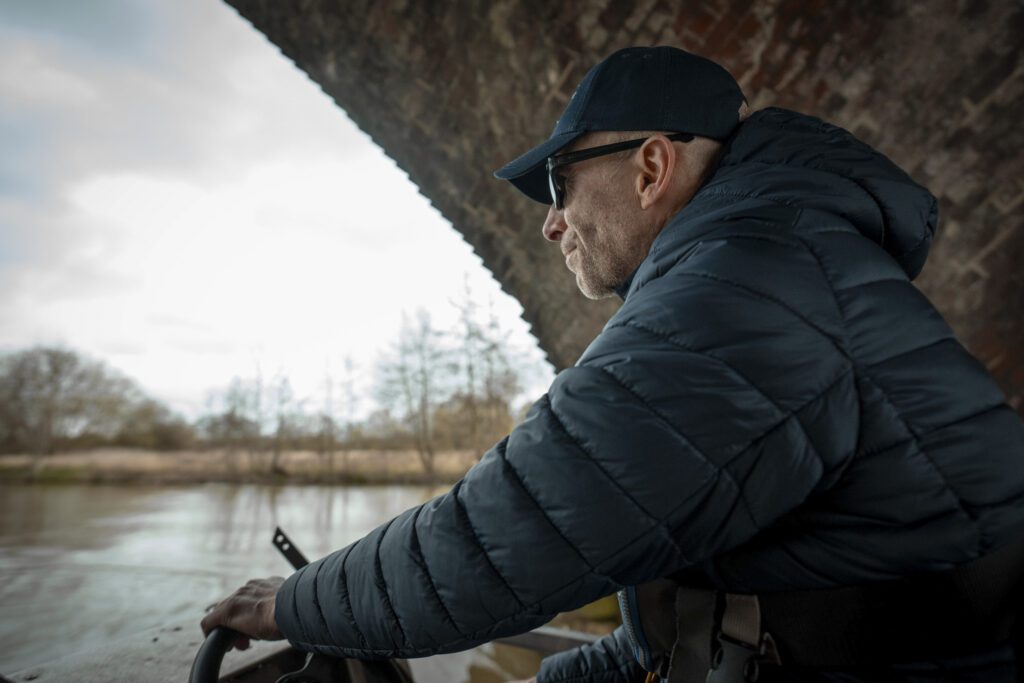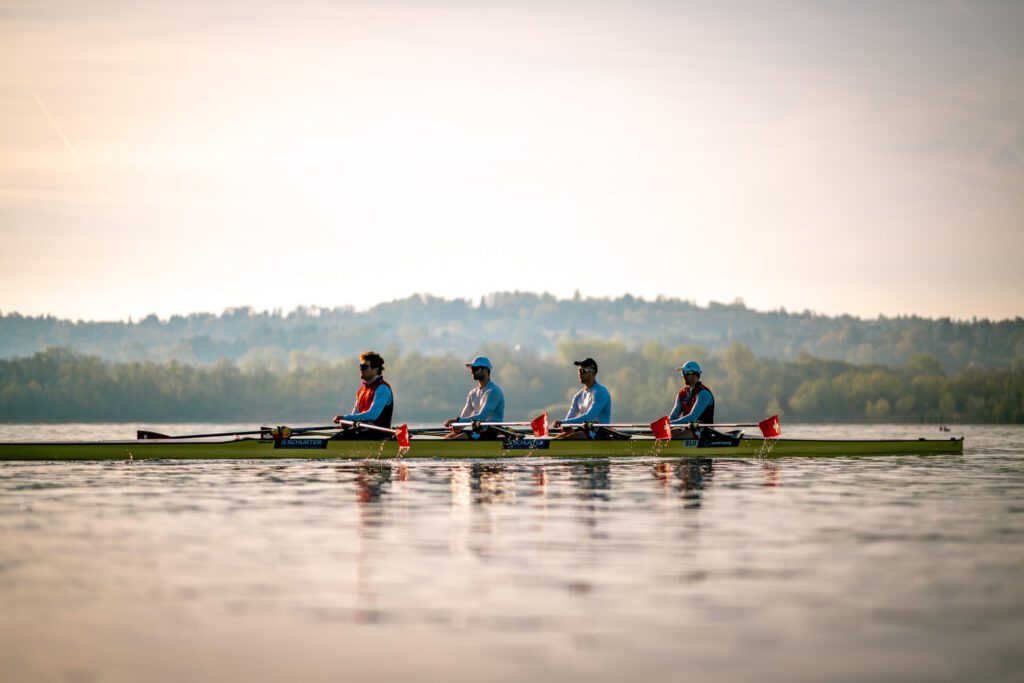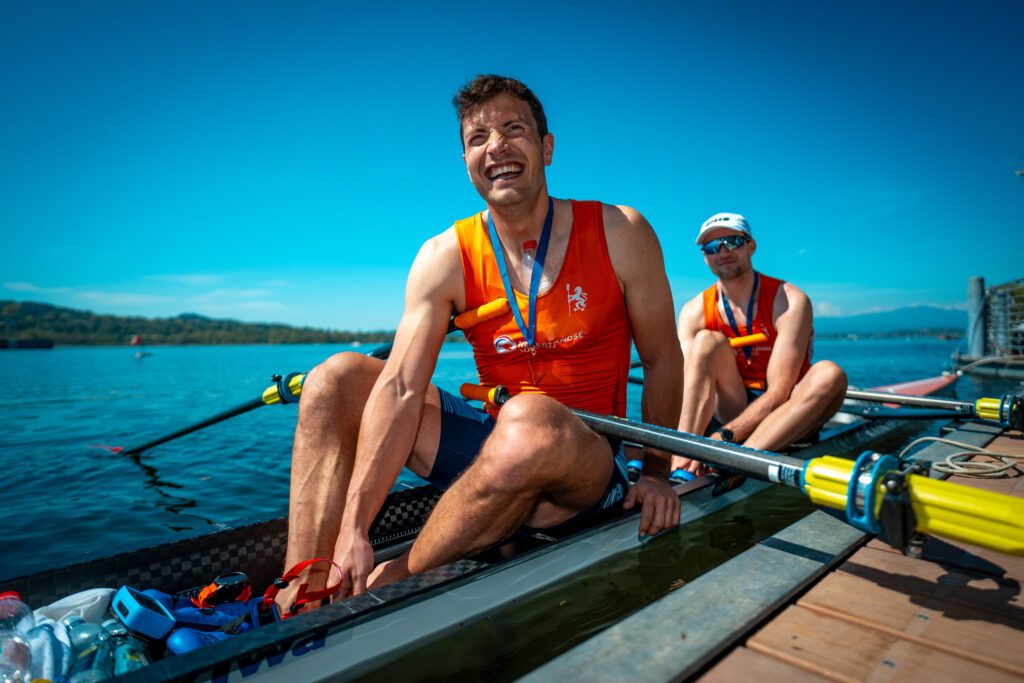A proud New Zealand junior team returned home last week from the 2019 World Junior Rowing Championships with their best result in over a decade. Finishing fifth (ahead of both USA & GBR) in the overall medal table, and with three of the four crews making A finals while no crew finished outside of the top seven in the world, this was undoubtably a strong showing for the Kiwis.
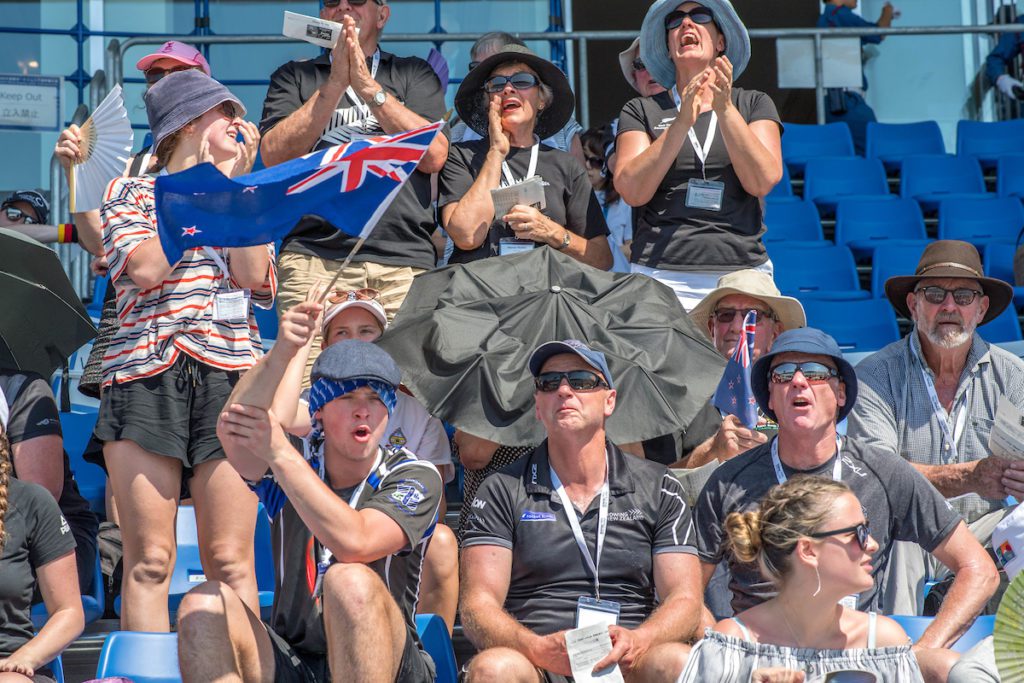
Photo New Zealand supporters out in force in Tokyo.
Credit Steve McArthur
The small team of 14 rowers, made up of eight girls and six boys racing in four crews, performed admirably as they competed in stifling heat on the Sea Forest Waterway, Tokyo where the regatta also doubled as the official 2020 Olympic Games test event.
The highlight for the New Zealand team was the gold medal winning performance of the girls quad. The crew of Phoebe Trolove (Craighead Diocesan School), Shakira Mirfin (Southland Girls’ High School), Rebecca Leigh (St Peter’s School), and Eva Hofmans (Bayfield High School) went through the regatta unbeaten.
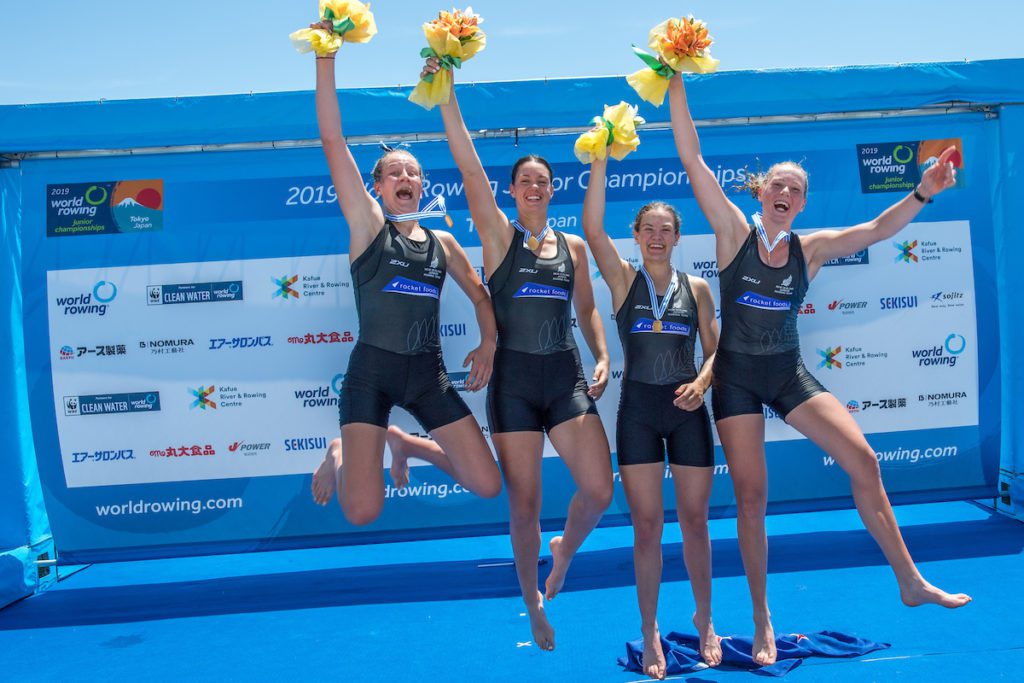
Photo Phoebe Trolove (stroke) (Craighead Diocesan School) Shakira Mirfin (Southland Girls High School), Rebecca Leigh (St Peters School) and Eva Hofmans (Bayfield High School) NZ Junior Womens Quadruple Scull
Credit Steve McArthur
With a plan so cunning you could put a tail on it and call it a weasel, New Zealand selectors picked the top four finishers in the women’s single at the New Zealand secondary schools’ championships and put them together in a quad.
It was certainly no easy task to bring four very different people with different sculling styles together and within the space of 10 weeks turn them into a world championship winning crew. Entrusted with the task was Nelson-based artist and rowing coach Hannah Starnes (check out her Instagram @hannah.starnes). With artistic flair, Starnes moulded a world beating crew.
It is safe to say that Hannah didn’t refer to the Dick Tonks coaching bible in her approach to coaching. Could you imagine Dick posting comments like this publicly about any of his champion crews?
Even Hannah’s heartfelt post after the A final breathed new life into the often dry commentary we are used to from national team coaches.
Unquestionably the New Zealand quad was not the most synchronised crew on the water, nor were they all rowing the same angles or even the same styles. What they did have was unity, boat speed and a steely determination to win. It wasn’t pretty but it was effective. They were tested in the final and following a slow start and sitting half a second behind Germany after 500m the girls powered away to dominate the last 1,500m, winning convincingly.
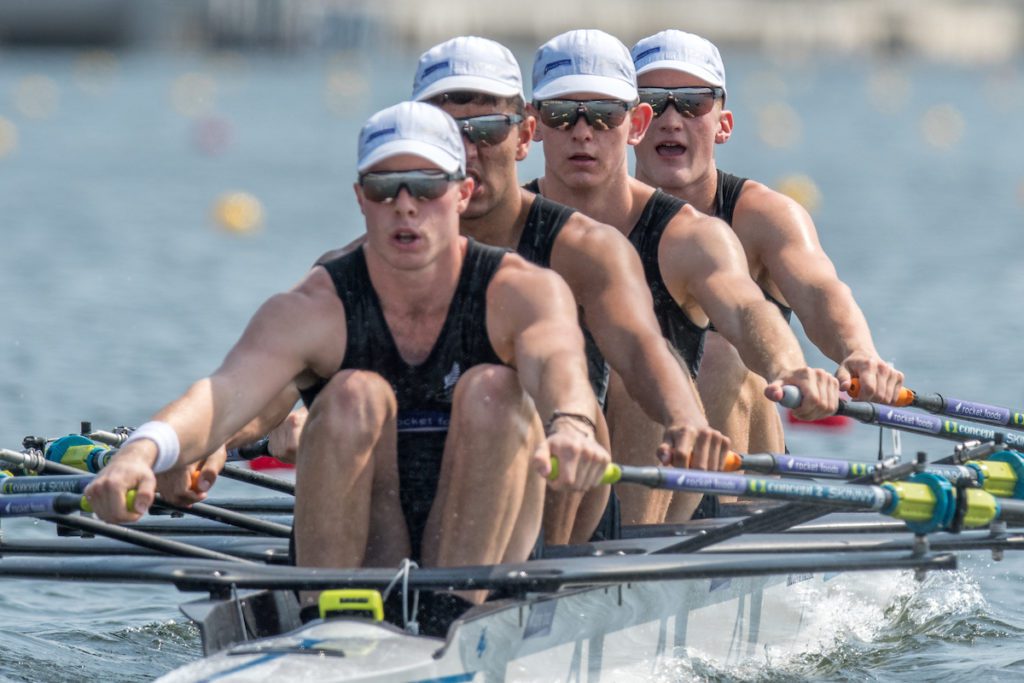
Photo NZL M4x
Credit Steve McArthur
The boy’s quadruple sculls crew looked like a crew destined for a place on the podium throughout the regatta, but despite a solid performance, qualifying second in the semi final (fourth fastest time overall), and winning their heat with the second fastest time overall, the boys will have been disappointed with their sixth place finish in the final.
The Kiwi girls coxless four suffered from a lack of entries in their event, resulting in just a heat and final for this young crew who would have benefited from extra races. Also working against them was the headwind conditions in the final which favoured the bigger crews. All-told, the four should be proud of their fifth place and the way they competed, they did the silver-fern proud.
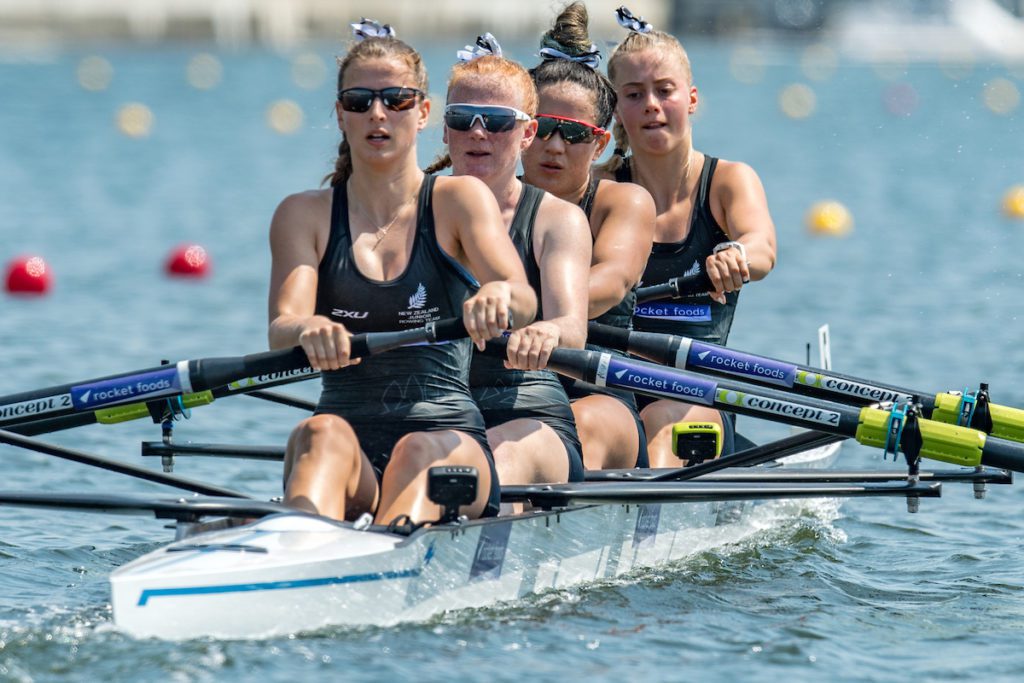
Photo NZL JW4+
Credit Steve McArthur
Unlikely crewmates came together in the New Zealand men’s double. The youthful and light Scott Shackleton (Christchurch Boys’ High School), and the mature and bigger Kobe Miller (Blenheim Rowing Club) were outsiders going into the event. The contrasting combination performed exceptionally well to win the B final, coming seventh overall in what was the biggest entry of the regatta, with 24 crews in total competing.
Shackleton is a born winner and his determination and ability to push his body beyond limits was unprecedented in junior rowing in New Zealand in 2019. If you like backing outsiders then consider placing a wager on Shackleton lining up in the lightweight men’s double at the Olympics next year. Coxswain Simon Dickie was the last Kiwi schoolboy to medal at an Olympics over 50 years ago.
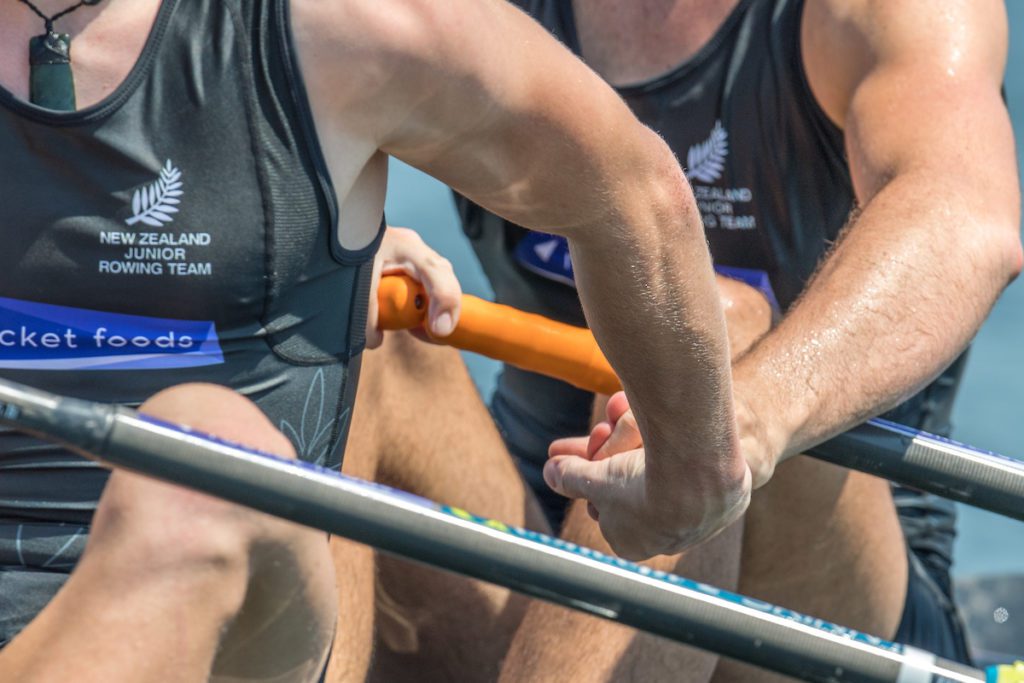
Photo Unlikely crew-mates came together in the New Zealand men’s double
Credit Steve McArthur
With five of the 14 members of the junior team eligible for another crack at the World Rowing Junior Championships in 2020 (Leigh, Mirfin, Burrell, Darry and Shackleton) New Zealand’s prospects look good for moving further up the medal table in Slovenia. But despite the strong performances of the 2019 Junior team, I cant help but feel Rowing New Zealand are missing a trick with their juniors and the role they play in the development of the sport in the country.
Over 66% of all competitive rowers in New Zealand are eligible to row at a junior world championships, when “just” 37% of British Rowing’s membership is made up of school-aged rowers. Junior rowing is the backbone of New Zealand rowing and provides the talent for its elite teams. While not all elite representative rowers come though the junior system, you can count on one hand those in the current elite team that didn’t start rowing at school.
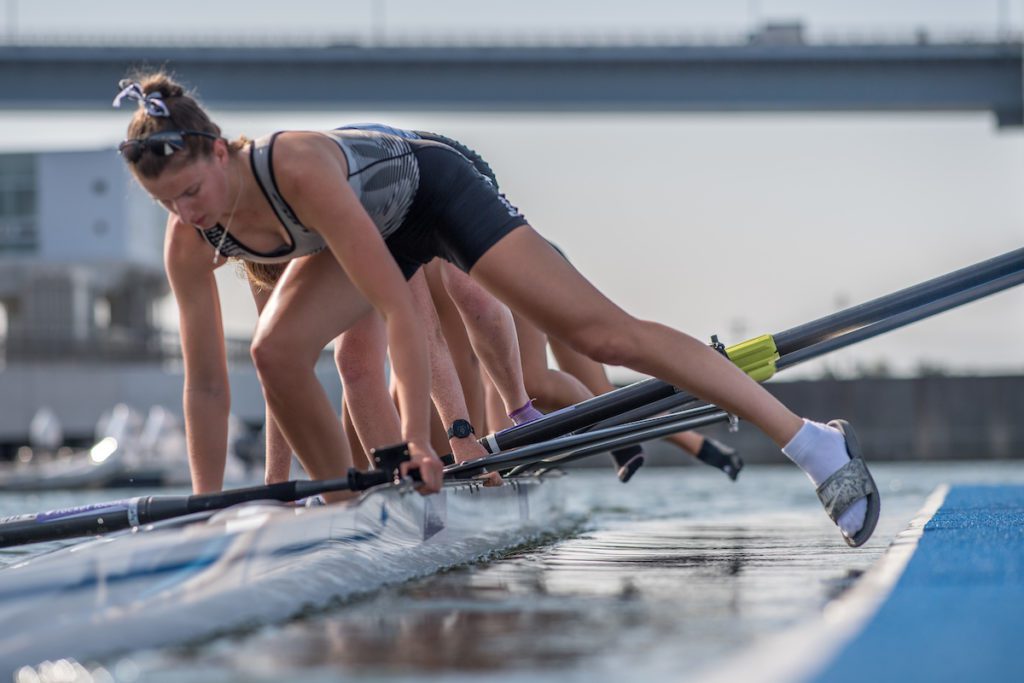
Photo The NZL JW4+
Credit Steve McArthur
With over 3,000 junior rowers, New Zealand can find only 14 of a standard to compete at the geographically closest ever junior world championships? Really?
The pinnacle event of the New Zealand domestic rowing calendar each year is the Maadi Cup, an eight oared sweep event raced between eight of the top junior boys crews in the land. The Maadi regatta is widely publicised as a world-leading junior regatta. Yet not one boys sweep crew was good enough for New Zealand to send to the junior worlds in 2019, nor was any coxswain.
While Olympic gold medallists inspire new rowers to pick up the oars, it is the young New Zealand junior national team rowers and coxswains who inspire their peers and set an achievable example for young athletes to aspire to. The timing of junior worlds puts it around the time when winter sports are ending – to have rowing in the conversation at many schools around the country in August is essential.
Junior international rowing is also an important pathway to develop coaches and identify coaching talent that may not be involved in the regional performance centres – such as two of the three coaches in Tokyo were. The most successful coaches at the junior level in recent times have come from school programs.
Aspiring junior crews have to meet prognostic times at trials, and it is recognised that selectors can’t just give away the black one-piece. But there is a bigger picture to be looked at; the overall development and wellbeing of the sport and its athletes.
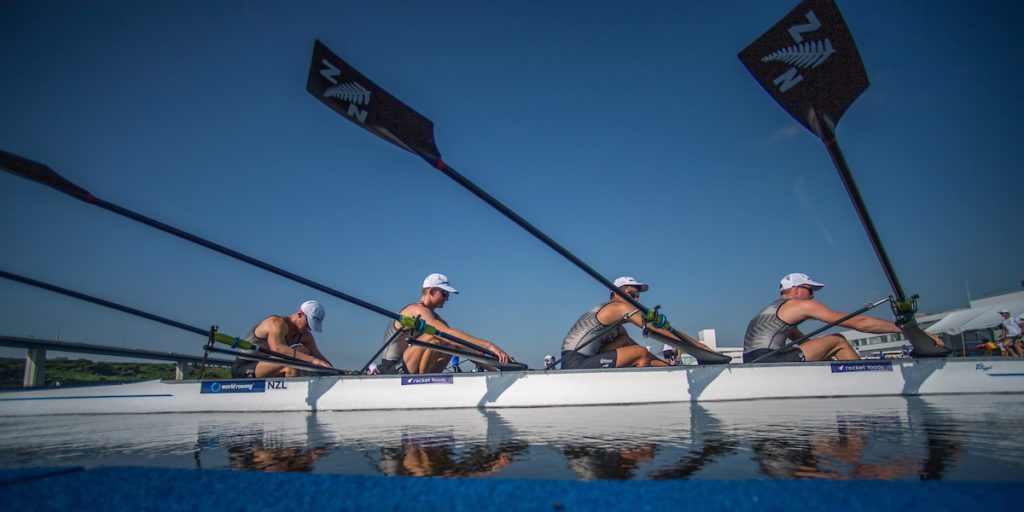
Photo NZL JM4x
Credit Steve McArthur
Could you imagine New Zealand Rugby not picking a New Zealand school team because the goal kicker missed four out of 10 shots at goal during trials? Or New Zealand Netball not picking a New Zealand school team becuase the shooter missed the shooting progs?
No, they pick the best team available, regardless of what talent is available.
The 2019 Henley Royal Regatta Grand Challenge Cup winners included a few rowers that finished well out of the medals when they raced juniors, including Hamish Bond (2003 JM8+ 6th), Shaun Kirkham (2009 JM8+ 9th) and Phillip Wilson (2014 JM2X 14th). Its not about the results, but the development of athletes.
Representing New Zealand at a junior world championships is not necessarily a pathway to the elite team or even to further national team honours. Current super stars of New Zealand rowing Kerri Gowler, Robbie Manson, Kelsey Bevan and Mahé Drysdale didn’t represent New Zealand at the junior level at all. However, nearly two thirds of the current elite team that contested the world cups in 2019 did. Of these 49 athletes, 29 raced for New Zealand at a junior worlds. Of the 22 women, 16 raced junior worlds and of the 25 men, 13 raced junior worlds.
Not picking a junior boy’s sweep crew for Tokyo 2019 was a massive step backwards for the wonderful sport of rowing in New Zealand. Hopefully the Rowing New Zealand board will recognise the opportunity they have missed and set in place a better policy for the future of junior rowing.
New Zealand has not had a coxswain at the past three junior world championships. Not since Auckland Grammar’s Jonty Du Toit piloted the Junior “lost-boys” eight to fourth place at the ‘Mega-Worlds’ in Rotterdam in 2016. All school fours and eights are coxed in domestic junior rowing races in New Zealand. There is no coxless four or coxless quad races in New Zealand until the athletes have left secondary school (junior age). Both the current New Zealand elite coxswains; Sam Bosworth (2012 JM4+ 1st) and 2014 men’s pair World Champion Caleb Shepherd (2010 JM4+ 6th) had their first taste of international competition with the New Zealand junior national team.
I would suggest that the Rowing New Zealand board consider implementing the following for future World Rowing Junior Championship teams:
- Minimum of 20 athletes to be selected for Junior Worlds
- Minimum of one coxed boat (4 out of 14 events are coxed)
- Minimum of one Boys sweep crew (2-,4-,4+,8+)
- Minimum of one Girls sweep crew (2-,4-,4+,8+)
- Minimum of one Boys sculling crew (1x,2x,4x)
- Minimum of one Girls sculling crew (1x,2x,4x)
- Minimum of four coaches
If the Maadi Cup winning Christchurch Boys High School eight had been selected in its entirety, arguably it could have made the A final in Tokyo. This schoolboy eight did a blistering 5.51 on Lake Ruataniwha early in March to win the South Island Champs then backed it up with a 5.54 to win the Maddi Cup at Karapiro a few weeks later. When you add in the best oarsmen from Westlake Boys, Christ’s College, Auckland Grammar, Hamilton Boys etc then in theory you should have an even faster crew.
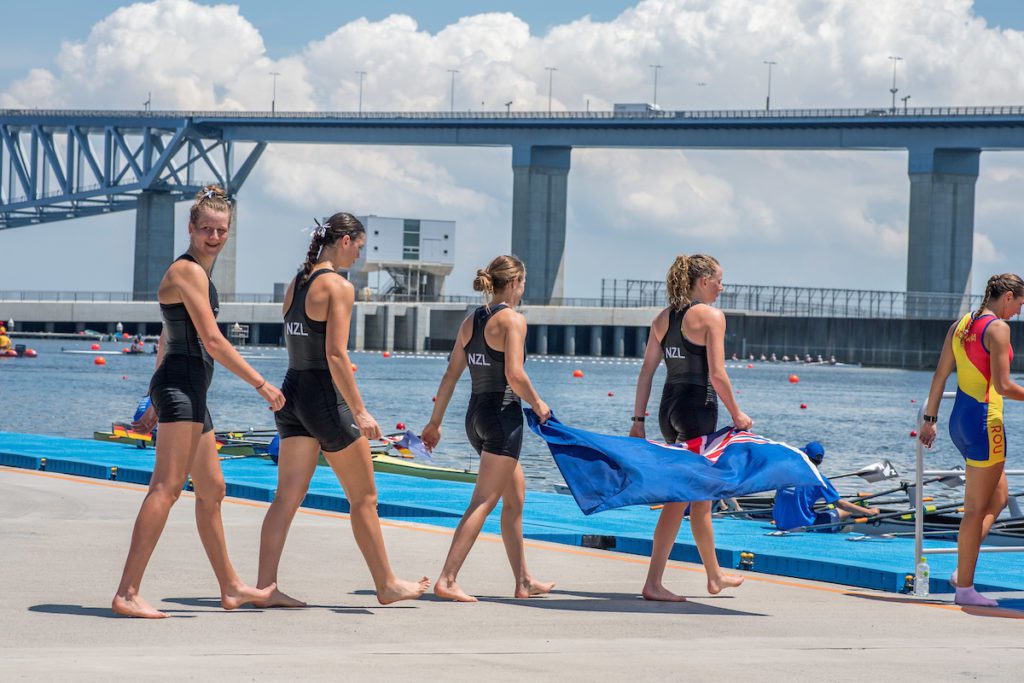
Photo NZL JW4x
Credit Steve McArthur
If the trials process didn’t find this out, then it is more likely that the trials process is lacking rather than the athletes. But for New Zealand not to send a sweep crew at all seems unfathomable. How was this decision reached?
Lack of funding is not a valid argument as the junior program is largely self-funded, with athletes parting with the best part of NZ$10,000 to compete. For Tokyo, Rowing New Zealand sent a large support crew including the GM Performance, team manager, doctor, nutritionist, physiologist plus the three Coaches. The ratio of New Zealand team staff to athletes was preposterous, but understandable as it was the test event for next years Olympic Games. So if a large support team was being sent, why not send a appropriate compliment of athletes? Instead New Zealand sent its smallest team.
It was a bittersweet junior regatta for New Zealand, despite their successes. The outstanding Gold medal won by the girls quad was exceptional and backed up by strong performances across the entire squad, but sadly, somehow, too many capable girls and boys were left watching from the sofa at home.
NZL 2019 Junior World Rowing Championships Team
Women’s Quadruple Scull – 1st
Shakira Mirfin, Southland Girls’ High School
Eva Hofmans, Bayfield High School
Rebecca Leigh, St Peter’s School, Cambridge
Phoebe Trolove, Craighead Diocesan School
Hannah Starnes (coach)
Women’s Coxless Four – 5th
Alison Mills, St. Paul’s Collegiate
Sally Wylaars, Avonside Girls’ High School
Lucy Burrell, Baradene College
Charlotte Darry, St Margaret’s College
Nick Barton (coach)
Men’s Quadruple Scull – 6th
Ben Mason, Otago Boys High School
Seth Hope, Cambridge RC, Waikato RPC
Jason Nel, St Peter’s School Cambridge
William Thompson, Waikato Rowing Club, Waikato RPC
Duncan by de Ley (coach)
Men’s Double Scull – 7th
Kobe Miller, Blenheim Rowing Club, Central RPC
Scott Shackleton, Christchurch Boys’ High School
Duncan by de Ley (coach)
2019 New Zealand’s elite world cup contenders and their junior world championship record
Emma Twigg 2003 JW8+ 6th
Grace Prendergast 2010 JW4- 1st
Olivia Loe 2010 JW4X 11th
Brooke Donoghue 2013 JW4X 5th
Sam Voss 2014 JW4X 6th
Hannah Osborne 2012 JW4X 3rd
Zoe McBride 2012 JW4X 3rd
Beth Ross 2014 JW4- 8th
Ella Greenslade 2015 JW4- 3rd
Emma Dyke 2013 JW4- 5th
Jackie Gowler 2014 JW4- 8th
Kirstyn Goodger 2009 JW8+ 2nd
Lucy Spoors , 2007 JW4X 6th
Ruby Tew 2012 JW4X 3rd
Caleb Shepherd 2010 JM4+ 6th
Eve Macfarlane 2009 JW8+ 2nd
Kelsi Walters 2012 JW4- 3rd
Tom Murray 2012 JM4+ 1st
Michael Brake 2012 JM4+ 1st
Cameron Crampton 2012 JM4X 6th
Lewis Hollows 2011 JM4X 4th
Nathan Flannery 2010 JM4X 3rd
Hamish Bond, 2003 JM8+ 6th
Matt MacDonald 2017 JM4- 2nd
Shaun Kirkham 2009 JM8+ 9th
Stephen Jones 2011 JM4X 4th
James Lassche 2007 JM8+ 2nd
Phillip Wilson 2014 JM2X 14th
Sam Bosworth 2012 JM4+ 1st
